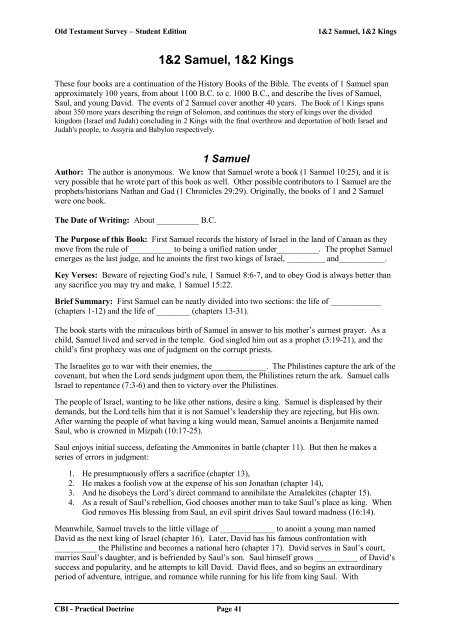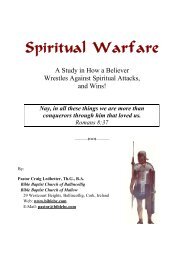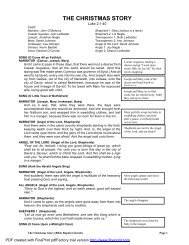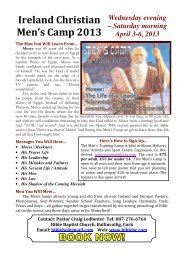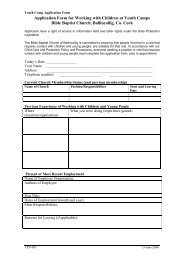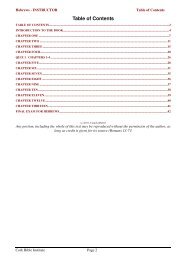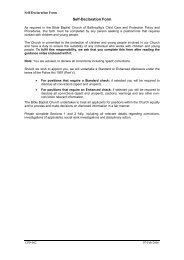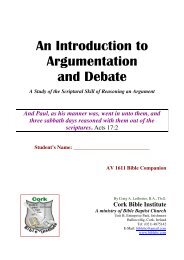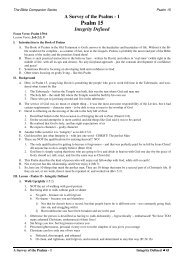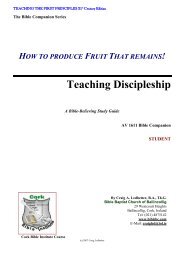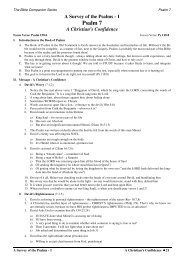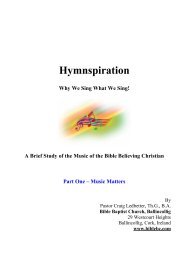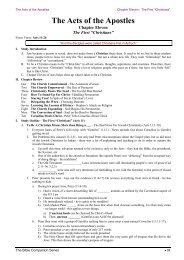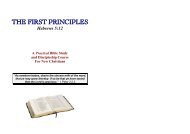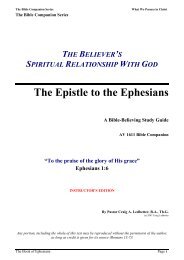Old Testament Survey - Student 5.pdf
Old Testament Survey - Student 5.pdf
Old Testament Survey - Student 5.pdf
You also want an ePaper? Increase the reach of your titles
YUMPU automatically turns print PDFs into web optimized ePapers that Google loves.
<strong>Old</strong> <strong>Testament</strong> <strong>Survey</strong> – <strong>Student</strong> Edition<br />
1&2 Samuel, 1&2 Kings<br />
1&2 Samuel, 1&2 Kings<br />
These four books are a continuation of the History Books of the Bible. The events of 1 Samuel span<br />
approximately 100 years, from about 1100 B.C. to c. 1000 B.C., and describe the lives of Samuel,<br />
Saul, and young David. The events of 2 Samuel cover another 40 years. The Book of 1 Kings spans<br />
about 350 more years describing the reign of Solomon, and continues the story of kings over the divided<br />
kingdom (Israel and Judah) concluding in 2 Kings with the final overthrow and deportation of both Israel and<br />
Judah's people, to Assyria and Babylon respectively.<br />
1 Samuel<br />
Author: The author is anonymous. We know that Samuel wrote a book (1 Samuel 10:25), and it is<br />
very possible that he wrote part of this book as well. Other possible contributors to 1 Samuel are the<br />
prophets/historians Nathan and Gad (1 Chronicles 29:29). Originally, the books of 1 and 2 Samuel<br />
were one book.<br />
The Date of Writing: About __________ B.C.<br />
The Purpose of this Book: First Samuel records the history of Israel in the land of Canaan as they<br />
move from the rule of __________ to being a unified nation under__________. The prophet Samuel<br />
emerges as the last judge, and he anoints the first two kings of Israel, _________ and___________.<br />
Key Verses: Beware of rejecting God’s rule, 1 Samuel 8:6-7, and to obey God is always better than<br />
any sacrifice you may try and make, 1 Samuel 15:22.<br />
Brief Summary: First Samuel can be neatly divided into two sections: the life of ____________<br />
(chapters 1-12) and the life of ________ (chapters 13-31).<br />
The book starts with the miraculous birth of Samuel in answer to his mother’s earnest prayer. As a<br />
child, Samuel lived and served in the temple. God singled him out as a prophet (3:19-21), and the<br />
child’s first prophecy was one of judgment on the corrupt priests.<br />
The Israelites go to war with their enemies, the_____________. The Philistines capture the ark of the<br />
covenant, but when the Lord sends judgment upon them, the Philistines return the ark. Samuel calls<br />
Israel to repentance (7:3-6) and then to victory over the Philistines.<br />
The people of Israel, wanting to be like other nations, desire a king. Samuel is displeased by their<br />
demands, but the Lord tells him that it is not Samuel’s leadership they are rejecting, but His own.<br />
After warning the people of what having a king would mean, Samuel anoints a Benjamite named<br />
Saul, who is crowned in Mizpah (10:17-25).<br />
Saul enjoys initial success, defeating the Ammonites in battle (chapter 11). But then he makes a<br />
series of errors in judgment:<br />
1. He presumptuously offers a sacrifice (chapter 13),<br />
2. He makes a foolish vow at the expense of his son Jonathan (chapter 14),<br />
3. And he disobeys the Lord’s direct command to annihilate the Amalekites (chapter 15).<br />
4. As a result of Saul’s rebellion, God chooses another man to take Saul’s place as king. When<br />
God removes His blessing from Saul, an evil spirit drives Saul toward madness (16:14).<br />
Meanwhile, Samuel travels to the little village of _____________ to anoint a young man named<br />
David as the next king of Israel (chapter 16). Later, David has his famous confrontation with<br />
__________ the Philistine and becomes a national hero (chapter 17). David serves in Saul’s court,<br />
marries Saul’s daughter, and is befriended by Saul’s son. Saul himself grows __________ of David’s<br />
success and popularity, and he attempts to kill David. David flees, and so begins an extraordinary<br />
period of adventure, intrigue, and romance while running for his life from king Saul. With<br />
CBI - Practical Doctrine Page 41
<strong>Old</strong> <strong>Testament</strong> <strong>Survey</strong> – <strong>Student</strong> Edition<br />
1&2 Samuel, 1&2 Kings<br />
supernatural aid, David narrowly but consistently eludes the bloodthirsty Saul (chapters 19-26).<br />
Through it all, David maintains his integrity and his friendship with _____________.<br />
Near the end of the book, Samuel has died, and Saul is a lost man. On the eve of a battle with the<br />
Philistines, Saul seeks for direction. Having rejected God, he finds no help from heaven, and he seeks<br />
counsel from a witch instead. During the séance, __________ soul rises from the dead to give one<br />
last prophecy: that Saul would die in battle the next day. The prophecy is fulfilled; Saul’s three sons,<br />
including Jonathan, die in the battle, and Saul commits suicide.<br />
Practical Application: The tragic story of Saul is a study in __________ ___________. Here was a<br />
man who had it all—honour from God and man, authority, riches, good looks, and more. Yet he died<br />
in despair, terrified of his enemies and knowing he had failed his nation, his family, and his God.<br />
Saul made the mistake of thinking disobedience didn’t matter. Like many today, he believed that a<br />
sensible motive will compensate for bad behaviour. Perhaps his power went to his head, and he began<br />
to think he was above the rules. Somehow he developed a low opinion of God’s commands and a<br />
high opinion of himself. Even when confronted with his wrongdoing, he attempted to justify himself,<br />
and that’s when God rejected him (15:16-28).<br />
Saul’s problem is one we all face—a problem of the _________. Obedience to God’s will is<br />
necessary for success, and if we in pride rebel against Him, we set ourselves up for loss.<br />
David, on the other hand, did not seem like much at first. Even Samuel was tempted to overlook him<br />
(16:6-7). But God sees the heart and saw in David a man who would follow after His own heart<br />
(13:14). The humility and integrity of David, coupled with his boldness for the Lord and his<br />
commitment to prayer, sets a good example for all of us.<br />
A Simple Outline of 1 Samuel<br />
I. Birth and Early Years of ____________(1:1-4:1a) – Hannah’s Burden, Faith, and Blessing<br />
A. Eli's Family Problems (2:12-36)<br />
B. God speaks with Samuel (3:1-18)<br />
C. Samuel, the prophet (3:19-4:1a)<br />
II. Samuel’s Leadership of Israel (4 – 15)<br />
A. Abuse of the _____ ____ _____ _____________ by the Philistines (4:1b-7:2)<br />
B. Samuel Judges Israel (7:3-17)<br />
C. The Quest for a King (8:1-12:25) – Saul is selected<br />
D. Samuel Steps Down from being Judge in Israel (12:1-25)<br />
E. Saul's Kingship (13:1-15:35) – Pretty good leader at first<br />
F. Saul's rejection as king after only two years (15:10-35)<br />
III. Saul and David (16:1-30:31)<br />
A. David's Rise to Power (16:1-18:30)<br />
1. Samuel anoints young David (16:1-13)<br />
2. David enters Saul's service as a _______ player (16:14-23)<br />
3. David kills Goliath (17:1-58)<br />
4. Jonathan and David become best of friends (18:1-5)<br />
5. Women praise David's abilities in battle (18:6-9) and causes envy in Saul’s heart<br />
6. Saul tries to kill David (18:10-11)<br />
7. David continues to succeed (18:12-16)<br />
8. David kills Philistines to marry Saul's daughter _________ (18:17-29)<br />
B. Saul Versus David (19:1-27:12)<br />
1. God protects David (19:1-21:15)<br />
2. David Protects His ______ (22:1-23:5)<br />
IV. Saul's Final Battle (28:1-31:13)<br />
CBI - Practical Doctrine Page 42
<strong>Old</strong> <strong>Testament</strong> <strong>Survey</strong> – <strong>Student</strong> Edition<br />
1&2 Samuel, 1&2 Kings<br />
2 Samuel<br />
The Author: The Book of 2 Samuel does not identify its author. It probably was Nathan and Gad<br />
(see 1 Chronicles 29:29).<br />
The Date of Writing: The events of 1 Samuel span approximately 100 years, from c. 1100 B.C. to c.<br />
1000 B.C. The events of 2 Samuel cover another 40 years. The date of writing, then, would be<br />
sometime after 960 B.C.<br />
The Purpose of Writing: 2 Samuel is the inspired record of King David’s reign.<br />
Key Verses: David’s kingdom and everlasting kingdom (2Sam 7:16); You cannot worship God<br />
without a cost (2Sam 24:24)<br />
Brief Summary: The book of 2 Samuel is broadly divided into two main sections—David’s<br />
________ (chapters 1-10) and David’s __________ (chapters 11-20). The last part of the book<br />
(chapters 21-24) is an appendix which contains further details of David’s reign that are not in<br />
chronological order.<br />
The book begins with David receiving news of the death of Saul and his sons. He proclaims a time of<br />
mourning. Soon afterward, David is crowned king over Judah, while Ish-bosheth, one of Saul’s<br />
surviving sons, is crowned king over Israel (chapter 2). A civil war follows, but Ish-bosheth is<br />
murdered, and the Israelites ask David to reign over them as well (chapters 4-5).<br />
David moves the country’s capital from Hebron to Jerusalem and later moves the ark of the covenant<br />
there as well in anticipation of building a permanent Temple there (chapters 5-6). David’s plan to<br />
build a temple in Jerusalem is vetoed by God, Who then promises David the following things:<br />
1) That David would have a son to rule after him;<br />
2) David’s son would build the temple;<br />
3) The throne occupied by David’s lineage would be established forever; and<br />
4) God would _______ take His mercy from David’s house (2 Samuel 7:4-16).<br />
David leads Israel to victory over many of the enemy nations which surrounded them. He also shows<br />
kindness to the family of Jonathan by taking in _______________, Jonathan’s crippled son (chapters<br />
8-10) and treating him as a son. A great picture of mercy and grace!<br />
Then, David falls. He lusts for a beautiful woman named Bathsheba, commits adultery with her, and<br />
then has her husband murdered (chapter 11). When Nathan the prophet confronts David with his sin,<br />
David confesses, and God graciously forgives. However, the Lord tells David that trouble would arise<br />
from within his own household.<br />
Trouble does come when David’s firstborn son, Amnon, rapes his half-sister, Tamar. In retaliation,<br />
Tamar’s brother Absalom kills Amnon. Absalom then flees Jerusalem rather than face his father’s<br />
anger. Later, Absalom leads a revolt against David, and some of David’s former associates join the<br />
rebellion (chapters 15-16). David is forced out of Jerusalem, and Absalom sets himself up as king for<br />
a short time. Absolom is overthrown, however, and—against David’s wishes—is killed by David’s<br />
general Joab. David mourns his fallen son.<br />
A general feeling of unrest plagues the remainder of David’s reign. The men of Israel threaten to split<br />
from Judah, and David must suppress another uprising (chapter 20).<br />
The book’s appendix includes information concerning a three-year famine in the land (chapter 21), a<br />
song of David (chapter 22), a record of the exploits of David’s bravest warriors (chapter 23), and<br />
David’s sinful census and the ensuing plague (chapter 24).<br />
CBI - Practical Doctrine Page 43
<strong>Old</strong> <strong>Testament</strong> <strong>Survey</strong> – <strong>Student</strong> Edition<br />
1&2 Samuel, 1&2 Kings<br />
Practical Application: Anyone can fall. Even a godly man like David, who truly desired to follow<br />
God and who was richly blessed by God, was susceptible to temptation. David’s sin with Bathsheba<br />
should be a warning to all of us to guard the heart. “Wherefore let him that thinketh he standeth take<br />
heed lest he fall” (1 Corinthians 10:12).<br />
God is gracious to forgive even the most awful of sins when we truly repent. However, healing the<br />
wound caused by sin does not always erase the scar. Sin has natural consequences, and even after he<br />
was forgiven, David reaped what he had sown. How much better to avoid sin in the first place, rather<br />
than having to seek forgiveness later!<br />
A Simple Outline of the Events of 2 Samuel<br />
I. David Mourns for Saul and Jonathan (1:1-27)<br />
A. David discovers Saul and Jonathan are dead (1:1-16) – the battle with the Philistines went bad<br />
B. The Song of David about Jonathan’s Death (1:17-27)<br />
II. David’s Way to Kingship (2:1-5:5)<br />
A. David is anointed King of Judah (2:1-4a)<br />
B. David rewards Jabesh-gilead for caring for Saul’s body (2:4b-7)<br />
C. Rebellious Ishbosheth appointed King of Israel (2:8-11)<br />
D. There is a brief War between Israel and Judah (2:12-3:1)<br />
E. David's sons are born (3:2-5)<br />
F. Abner defects from Saul’s army to David, Joab kills Abner out of jealousy (3:6-39)<br />
G. Ishbosheth is murdered and his head brought to David (4:1-12)<br />
H. David is finally anointed king of all Israel (5:1-3) – it has been ________ years since David’s<br />
anointing by Samuel<br />
III. David's Early Successes as King (5:6-10:19)<br />
A. David captures ____________ from the Jebusites for his capital (5:6-12)<br />
B. David has more sons (5:13-16)<br />
C. David’s Victories over the Philistines (5:17-25)<br />
D. David brings Ark to Jerusalem (6:1-23)<br />
E. God makes a covenant with David (7:1-29)<br />
F. Some of the nations David subdued (8:1-14)<br />
G. David's administration of Israel (8:15-18)<br />
H. David cares for Jonathan's son Mephibosheth (9:1-13)<br />
I. David defeats the Ammonites and Arameans (10:1-19)<br />
IV. David's Difficulties (11:1-21:22)<br />
A. David and Bathsheba (11:1-12:25)<br />
1. Adultery and murder (11:1-27)<br />
2. Nathan, the prophet, confronts David (12:1-15a)<br />
3. Death of Bathsheba's son (12:15b-23)<br />
4. The Birth of __________ (12:24-25)<br />
B. David conquers the Ammonites (12:26-31)<br />
C. Rape of David's daughter Tamar (13:1-39)<br />
1. Amnon rapes Tamar (13:1-19)<br />
2. David's inaction (13:20-22)<br />
3. Absalom kills Amnon and flees (13:23-39)<br />
D. _____________ rebellion against God, and his family (14:1-19:43)<br />
1. Absalom's return to David (14:1-33)<br />
CBI - Practical Doctrine Page 44
<strong>Old</strong> <strong>Testament</strong> <strong>Survey</strong> – <strong>Student</strong> Edition<br />
1&2 Samuel, 1&2 Kings<br />
2. Absalom leads a rebellion against David (15:1-12) – takes over the kingdom<br />
3. David flees Jerusalem (15:13-16:14)<br />
4. Absalom follows bad advice (16:15-17:14)<br />
5. David follows good advice (17:15-29)<br />
6. David's army defeats Absalom and Joab wrongfully kills Absalom (18:1-32)<br />
7. David mourns for Absalom (18:33-19:4)<br />
8. Joab shames David out of his mourning (19:5-8a)<br />
9. Those who opposed David plead for mercy (19:8b-43)<br />
E. The Rebellion of Sheba (20:1-22) – tries to set himself up as king, but is defeated<br />
F. David's officers and administrators (20:23-26)<br />
G. The Gibeonites get justice concerning Saul’s wrongful acts against them (21:1-14)<br />
H. David's age shows in a battle with Philistia (21:15-17)<br />
I. Battles against giants that were in the land still (21:18-22)<br />
V. The Song of David (22:1-51)<br />
VI. The Last Words of David (23:1-7)<br />
VII. David's Thirty Three Mighty Men and Their Victories (23:8-39)<br />
A. The Three Mightiest of the Mighty Men (23:8-17)<br />
1. Adino the Eznite (23:8) – slew ______ men single-handedly<br />
2. Eleazar (23:9-10) – fought all alone, until the sword “clave to his hand”<br />
3. Shammah (23:11-12) – defended a field of bean plants (________) single-handedly<br />
B. Bravery of three other mighty men (23:13-17) – risked their lives to get water for David from<br />
a well in Bethlehem<br />
C. The list of the Thirty Mighty men (23:18-39)<br />
VIII.<br />
David's Sinful _________ (24:1-25) – a matter of pride instead of war<br />
A. The Census (24:1-9) – not for war, but only for pride<br />
B. David repents (24:10)<br />
C. David's punishment (24:11-17)<br />
D. David builds an altar (24:18-25)<br />
CBI - Practical Doctrine Page 45
<strong>Old</strong> <strong>Testament</strong> <strong>Survey</strong> – <strong>Student</strong> Edition<br />
1&2 Samuel, 1&2 Kings<br />
1 Kings<br />
Author: The Book of 1 Kings does not specifically name its author. The tradition is that it was<br />
written by the Prophets Isaiah and Jeremiah.<br />
Date of Writing: The Book of 1 Kings was likely written between 750 – 650 B.C.<br />
The Purpose of Writing: This book is the sequel to 1 and 2 Samuel and begins by tracing Solomon's<br />
rise to kingship after the death of David. The story begins with a united kingdom, but ends in a nation<br />
divided into 2 kingdoms, known as Judah and Israel. 1 and 2 Kings are combined into one book in the<br />
Hebrew Bible. They show why God’s people were conquered by Babylon and taken captive when<br />
they should have been conquerors.<br />
Key Verses: God promises blessings on Solomon but only if he obeys (1Kings 3:5-14); Solomon<br />
loved MANY women (1 Kings 11:1); Elijah had great power with God by prayer (1 Kings 17:1)<br />
Brief Summary: The book starts with _________ and<br />
ends with _________. The difference between the two<br />
gives you an idea as to what lies between. Solomon was<br />
born after a palace scandal between David and Bathsheba.<br />
Like his dad, he had a weakness for women that would<br />
bring him down. Solomon did well at first, praying for<br />
wisdom and building a temple to God that took 7 years. But<br />
then he spent 13 years building a palace for himself. His<br />
accumulation of many wives led him to worship their idols<br />
and led him away from God. This, in turn, led the nation<br />
away from God and even the preaching of Elijah could not<br />
bring them back. Elijah tried, even to challenging the idols<br />
to overpower God, and God won. This made Queen Jezebel<br />
angry (to say the least). She ordered Elijah's death so he ran<br />
away and said; "Let me die." God sent food to the prophet<br />
and whispered in a "still, small, voice", and in the process<br />
saved his life for further work. But Elijah never regained<br />
his confidence in the Lord after that due to depression.<br />
Practical Application: In between Solomon and Elijah,<br />
you will find it all. Rebellion, corruption, courage and<br />
faith. You will see that their world is much like ours. Things haven't changed and neither has God.<br />
The quiet, gentle sound that encouraged Elijah will encourage you. Makes sure you listen for it, and<br />
listen to it, so that you can obey every word and be blessed again!<br />
I. Solomon Becomes King (1:1-2:46)<br />
A. David's last acts (1:1-2:12)<br />
A Simple Outline of 1 Kings<br />
1. A pitiful David (1:1-4) – weak and worn out<br />
2. Adonijah's bid for kingship (1:5-10)<br />
3. Nathan and Bathsheba encourage David to make Solomon king (1:11-27)<br />
4. David gives instructions about his son Solomon being the next king (1:28-37)<br />
5. Solomon is proclaimed king (1:38-48)<br />
6. Adonijah pleads for mercy (1:49-53)<br />
7. David's final instructions to Solomon (2:1-9)<br />
8. David's death and burial (2:10)<br />
9. Solomon established as king (2:12)<br />
CBI - Practical Doctrine Page 46
<strong>Old</strong> <strong>Testament</strong> <strong>Survey</strong> – <strong>Student</strong> Edition<br />
1&2 Samuel, 1&2 Kings<br />
B. Solomon removes potential threats from his authority (2:13-46)<br />
1. Adonijah killed (2:13-25)<br />
2. Abiathar banished (2:26-27)<br />
3. Joab killed (2:28-35)<br />
4. Shimei killed (2:36-46a)<br />
5. Solomon established as king (2:46b)<br />
II. Solomon's Glory (3:1-10:29; Cf Lk 12:27)<br />
A. His Marriage to Pharaoh's daughter (3:1)<br />
B. He makes a questionable Sacrifice at the high places (3:2-3)<br />
C. Solomon's wisdom (3:4-28)<br />
1. Solomon asks God for wisdom (3:4-15)<br />
2. Solomon shows his wisdom - determines the mother of a son (3:16-28)<br />
D. Solomon's administrators (4:1-19)<br />
E. Solomon's influence over the surrounding kingdoms (4:20-21)<br />
F. Solomon's provisions and wealth (4:22-28)<br />
G. More of Solomon's wisdom (4:29-34)<br />
H. Solomon's building projects (5:1-7:51)<br />
1. The _________ (5:1-6:38) – 7 years in the making<br />
2. Other building projects (7:1-14) like his own house<br />
3. Further Temple work (7:15-51)<br />
I. Dedication of the Temple (8:1-66) – Solomon’s<br />
wisest prayer<br />
J. God makes a covenant with Solomon (9:1-9)<br />
K. The Cost and administration of Solomon's building<br />
(9:10-23)<br />
L. Further building projects (9:24)<br />
M. Solomon's sacrifices (9:25)<br />
N. Solomon's naval fleet (9:26-28)<br />
O. Solomon and the Queen of Sheba (10:1-10)<br />
P. Solomon's incredible wealth (10:11-27)<br />
Q. Solomon's chariot and horse business (10:28-29)<br />
III. Solomon's Sin and Death (11:1-43)<br />
A. Solomon's sin (11:1-8) – like father (David and Bathsheba), like son<br />
1. Marrying _________ women (11:1-3) – unequal yokes (2Cor 6)<br />
2. Worshiping other gods (11:4-8)<br />
B. Solomon's punishment (11:9-40)<br />
1. The Kingdom will not be given to his son (11:9-13)<br />
2. Enemies will win over the nation (11:14-40)<br />
C. The Death of Solomon (11:41-43)<br />
IV. Split Kingdom - Two Kings: ___________ of Judah, and ___________of Israel (12:1-14:31)<br />
A. Rehoboam, Solomon's son, loses northern tribes (12:1-19)<br />
B. Jeroboam made King of Israel (12:20)<br />
C. Rehoboam warned not to fight Israel (12:21-24)<br />
D. Jeroboam's capital is in Samaria and he worship golden calves (12:25-33)<br />
E. The Man of God from Judah - an early prophet (13:1-32)<br />
F. Jeroboam's sin (13:33-34)<br />
CBI - Practical Doctrine Page 47
<strong>Old</strong> <strong>Testament</strong> <strong>Survey</strong> – <strong>Student</strong> Edition<br />
1&2 Samuel, 1&2 Kings<br />
G. Ahijah, the prophet (14:1-18)<br />
H. Summary notes on Jeroboam (14:19-20)<br />
I. Rehoboam's sin of idolatry and toleration of sodomites, and resulting punishment (14:21-28)<br />
J. Summary notes on Rehoboam (14:29-31)<br />
V. Series of Kings (15:1-16:28)<br />
A. Abijam of Judah (15:1-8) – evil king<br />
B. Asa of Judah (15:9-24) – good king<br />
C. Nadab of Israel (15:25-32) – evil king<br />
D. Baasha of Israel (15:33-16:7) – evil king<br />
E. Elah of Israel (16:8-10) – drunken king<br />
F. Zimri of Israel (16:11-20) – Good king<br />
G. Omri of Israel (16:21-28) – very evil king<br />
VI. King ______ of Israel and ________, the prophet in Israel (16:29-22:40)<br />
A. Ahab's wicked sins (16:29-34) – married Jezebel, worshipped Baal, and made idol groves<br />
B. Elijah's ministry (17:1-19:21)<br />
1. Elijah predicts 3 ½ year drought (17:1)<br />
2. Elijah taken cared of during the drought – first at a small creek, and then in a widow’s<br />
home in Zarephath (17:2-24)<br />
3. Elijah’s Meeting with Ahab (18:1-19)<br />
4. Contest on Mount Carmel (18:20-40) – 850 false prophets of Baal<br />
5. Drought ends (18:41-46)<br />
6. Worn-out Elijah flees and hears still, small voice of God (19:1-18)<br />
7. The Calling of Elisha to take Elijah’s place (19:19-21)<br />
C. Israel defeats Syria guided by prophets (20:1-43)<br />
D. ____________ vineyard is stolen by Jezebel for Ahab (21:1-29)<br />
E. Israel and Judah fight against Ramoth-gilead (22:1-40) – Judah should NOT have sided with<br />
Israel<br />
1. A questionable alliance (22:1-4)<br />
2. The Prophecy of a good prophet named __________ (22:5-28)<br />
3. Israel and Judah defeated (22:29-36)<br />
4. The Death of Ahab (22:37-40)<br />
VII. Two More Kings (22:41-53)<br />
A. Jehoshaphat of Judah (22:41-53) – a good king<br />
B. Ahaziah of Israel (22:51-53) – an evil king<br />
CBI - Practical Doctrine Page 48
<strong>Old</strong> <strong>Testament</strong> <strong>Survey</strong> – <strong>Student</strong> Edition<br />
1&2 Samuel, 1&2 Kings<br />
2 Kings<br />
Author: The Book of 2 Kings does not name its author. The tradition is that the prophets Isaiah and<br />
Jeremiah were the authors of both 1 and 2 Kings.<br />
Date of Writing: The Book of 2 Kings, along with 1 Kings, was likely written between 650 – 600<br />
B.C.<br />
Purpose of Writing: The Book of 2 Kings continues the story of the rulers over the divided kingdom<br />
of Israel and Judah. 2 Kings concludes with the final overthrow and deportation of both Israel and<br />
Judah's people, to Assyria and Babylon respectively.<br />
Key Verses: Elisha desires _______ the spirit and power that Elijah had on him from Go (2Kings<br />
2:9); a few times the kings would have a good testimony (like 2 Kings 22:2); but most of the time, the<br />
kings had a bad testimony (2Kings 13:2); Judah is finally defeated by Nebuchadnezzar (2Kings 25:8-<br />
10)<br />
Brief Summary: 2 Kings describes the downfall of the divided kingdom. Prophets continue to warn<br />
the people that the judgment of God is at hand, but they choose not to repent. The kingdom of Israel is<br />
repeatedly ruled by wicked kings, and even though a few of Judah's kings are good, the majority are<br />
bad. These few good rulers, along with Elisha and other prophets, cannot stop the nation's decline and<br />
ultimate ruin. The Northern Kingdom of Israel is eventually destroyed by the Assyrians, and about<br />
136 years later the Southern Kingdom of Judah is destroyed by the Babylonians.<br />
Practical Application: God hates sin and He will not allow it to continue indefinitely. God may at<br />
times use heathen authorities to bring correction to His people. God loves us so much that He<br />
sometimes has to discipline us (Heb 12:5-12). God gives us warning before delivering His judgment<br />
upon us. We can have total confidence that God will never leave us or forsake us even when he is<br />
having to chastise us.<br />
I. Final Acts of Elijah (1:1-2:12)<br />
A General Outline of 2 Kings<br />
A. Elijah predicts death of king Ahaziah (1:1-18)<br />
B. Elijah taken up in whirlwind (2:1-12) – an <strong>Old</strong> <strong>Testament</strong> __________<br />
C. Elisha desires God’s power on his life – twice as much as was on Elijah<br />
II. The Ministry of Elisha (2:13-9:10)<br />
A. Elisha Picks up Elijah's mantle (2:13-14) – a sign of following in his ministry<br />
B. Futile search for Elijah’s body (2:15-18)<br />
C. Miracle - Purifies water (2:19-22)<br />
D. Curses young men who ridicule him (2:23-25)<br />
E. Jehoram of Israel (3:1-3)<br />
F. Prophesies against Moab (3:4-27)<br />
G. Miracle - Makes oil (4:1-7)<br />
H. Elisha and the woman of Shunem (4:8-37) – she makes him a small apartment<br />
I. Miracle - Purifies stew (4:38-41)<br />
J. Miracle - Multiplies food (4:42-44)<br />
K. Miracle - Cures Naaman the Syrian of leprosy ((5:1-27)<br />
L. Miracle - Axe head floats (6:1-7)<br />
M. Battles the Syrians (6:8-8:15)<br />
N. King Jehoram of Judah (8:16-24)<br />
O. King Ahaziah of Judah (8:25-29)<br />
P. Anoints Jehu as King of Israel (9:1-10)<br />
CBI - Practical Doctrine Page 49
<strong>Old</strong> <strong>Testament</strong> <strong>Survey</strong> – <strong>Student</strong> Edition<br />
1&2 Samuel, 1&2 Kings<br />
Q. List of Miracles of the prophets Elijah and Elisha<br />
14 Miracles of Elijah 28 Miracles of Elisha<br />
1. Causing the rain the cease for 3 1/2 years (1Ki 17:1)<br />
2. Being fed by the ravens (1Ki 17:4)<br />
3. Miracle of the barrel of meal and cruse of oil (1Ki<br />
17:14)<br />
4. Resurrection of the widow's son (1Ki 17:22)<br />
5. Calling of fire from heaven on the altar (1Ki 18:38)<br />
6. Causing it to rain (1Ki 18:45)<br />
7. Prophecy that Ahab's sons would all be destroyed (1Ki<br />
21:22)<br />
8. Prophecy that Jezebel would be eaten by dogs (1Ki<br />
21:23)<br />
9. Prophecy that Ahaziah would die of his illness (2Ki<br />
1:4)<br />
10. Calling fire from heaven upon the first 50 soldiers (2Ki<br />
2:10)<br />
11. Calling fire from heaven upon the second 50 soldiers<br />
(2Ki 2:12)<br />
12. Parting of the Jordan (2Ki 2:8)<br />
13. Prophecy that Elisha should have a double portion of<br />
his spirit (2Ki 2:10)<br />
14. Being caught up to heaven in a whirlwind (2Ki 2:11)<br />
III.<br />
_______ of Israel (9:11-10:36) – a zealous killer!<br />
A. Jehu kills Joram and Ahaziah (9:11-29)<br />
B. Jehu kills Jezebel (9:30-37)<br />
C. Jehu kills Ahab's 70 sons (10:1-11)<br />
D. Jehu kills Ahaziah's 42 sons (10:12-14)<br />
E. Jehu kills other relatives of Ahab (10:15-17)<br />
F. Jehu kills prophets of Baal (10:18-28)<br />
G. Concluding notes on Jehu (10:29-36)<br />
IV. Long Series of Kings (11:1-17:41)<br />
A. Queen Athaliah of Judah (11:1-20) – a very evil woman<br />
1. Athaliah's deeds (11:1-3)<br />
2. Jehoida, the priest, overthrows Athaliah (11:4-16)<br />
3. Jehoida mediates a covenant (11:17-20)<br />
B. King Jehoash of Judah (11:21-12:21) – a good king<br />
C. King Jehoahaz of Israel (13:1-9) – an evil king<br />
D. King Jehoash of Israel (13:10-13) – an evil king<br />
E. Death and last miracle of Elisha (13:14-21)<br />
CBI - Practical Doctrine Page 50<br />
1. Parting of the Jordan River (2Ki 2:14)<br />
2. Healing of the drinking waters with SALT(2Ki 2:21)<br />
3. Curse of the she bears against 42 children (2Ki 2:24)<br />
4. Prophecy commanding the filling of the valley with<br />
water for the victory against the Moabites (2Ki 3:17)<br />
5. Deception of the Moabites with the valley of blood<br />
(2Ki 3:22)<br />
6. Miracle of the vessels of oil for the widow woman (2Ki<br />
4:4)<br />
7. Prophecy that the Shunammite woman would have a<br />
son (2Ki 4:16)<br />
8. Resurrection of the Shunammite's son (2Ki 4:34)<br />
9. Purification of a poisoned stew (2Ki 4:41)<br />
10. Miracle of the feeding of 100 men with bread (2Ki<br />
4:43)<br />
11. The healing of Naaman the leper in the Jordan River<br />
(2Ki 5:14)<br />
12. Perception of Gehazi's transgression (2Ki 5:26)<br />
13. Cursing Gehazi with leprosy (2Ki 5:27)<br />
14. Floating of the axe head (2Ki 6:6)<br />
15. Prophecy of the Syrian battle plans (2Ki 6:9)<br />
16. Vision of the angelic chariots and army (2Ki 6:17)<br />
17. Smiting the Syrian army with blindness (2Ki 6:18)<br />
18. Restoring the sight of the Syrian army (2Ki 6:20)<br />
19. Prophecy of the end of the great famine (2Ki 7:1)<br />
20. Prophecy that the scoffing nobleman would see, but not<br />
partake of, the abundance to be given to the people (2Ki<br />
7:2)<br />
21. Deception of the Syrians with the sound of chariots<br />
(2Ki 7:6)<br />
22. Prophecy of the seven-year famine (2Ki 8:1)<br />
23. Prophecy of Benhadad's untimely death (2Ki 8:10)<br />
24. Prophecy of Hazael's cruelty to Israel (2Ki 8:12)<br />
25. Prophecy that Jehu would smite the house of Ahab (2Ki<br />
9:7)<br />
26. Prophecy that Joash would smite the Syrians at Aphek<br />
(2Ki 13:17)<br />
27. Prophecy that Joash would smite Syria thrice but not<br />
consume it (2Ki 13:19)<br />
28. Resurrection of the man touched by his bones (2Ki<br />
13:21)
<strong>Old</strong> <strong>Testament</strong> <strong>Survey</strong> – <strong>Student</strong> Edition<br />
1&2 Samuel, 1&2 Kings<br />
F. Hazael and Ben-hadad of Aram (13:22-25)<br />
G. King Amaziah of Judah (14:1-14) – a good king<br />
H. King Jeroboam II of Israel (14:23-29) – an evil king<br />
I. Azariah (Uzziah) of Judah (15:1-7) – a good king<br />
J. Zechariah of Israel (15:8-12) – an evil king<br />
K. Shallum of Israel (15:13-16) – an evil king<br />
L. Menahem of Israel (15:17-22) – an evil king<br />
M. Pekahiah of Israel (15:23-26) – an evil king<br />
N. Pekah of Israel (15:27-31) – an evil king<br />
O. Jotham of Judah (15:32-38) – a good king<br />
P. Ahaz of Judah (16:1-20) – an evil king<br />
Q. Hoshea of Israel (17:1-41) – an evil king<br />
1. Introductory notes on Hoshea (17:1-2)<br />
2. Israel becomes submitted to the King of Assyria (17:3-4)<br />
3. Assyria conquers Israel (17:5-6)<br />
4. Israel's and Judah’s sin (17:7-41)<br />
V. King ___________ of Judah (18:1-20:21) – a good king<br />
A. Hezekiah's reform (18:1-8)<br />
B. Assyria conquers the northern areas of Israel (18:9-12)<br />
C. Sennacherib of Assyria invades Judah but can’t defeat Jerusalem (18:13-19:37)<br />
D. Hezekiah's illness and miraculous recovery because of prayer (20:1-11)<br />
E. Hezekiah foolishly entertains Babylonian envoys (20:12-19)<br />
VI. The Final Kings of Judah (21 – 25)<br />
A. King Manasseh of Judah (21:1-18) – an evil king<br />
B. King Amon of Judah (21:19-26) – an evil king<br />
C. King _________ of Judah (22:1-23:30) – a good king<br />
1. Introductory notes on Josiah (22:1-2)<br />
2. Josiah's reform (22:3-23:27)<br />
a. Repair of Temple (22:3-7)<br />
b. Finding the Book of the Law (22:8-13)<br />
c. The Prophecy of Huldah, the prophetess (22:14-20) – how to get right with God<br />
d. General renewal of the Covenant of Judah with God (23:1-3)<br />
e. The Passover is held (23:21-23) – it has been a long time since the last Passover<br />
f. God still is determined to destroy Judah (23:26-27)<br />
3. The Death of good King Josiah (23:28-30)<br />
D. King Jehoahaz of Judah (23:31-33) – an evil king<br />
E. King Jehoiakim (Eliakim) of Judah (23:34-37) – an evil king<br />
F. Babylon Conquers Judah (24:1-25:30)<br />
1. Babylon attacks Judah (24:1-4)<br />
2. Death of King Jehoiakim (24:5-7)<br />
3. King Jehoiachin of Judah (24:8-9) –___________________________ – so wicked that<br />
God says there would be NO MORE SONS of David from Jehoiachin on the throne –<br />
calls him Coniah in Jeremiah 22:24-30; 37:1<br />
4. The Fall of Judah (24:10-16)<br />
5. Zedekiah (Mattaniah) is set up as a submissive king of Judah (24:17-20)<br />
6. The Destruction of Jerusalem by Babylon (25:1-21)<br />
7. Gedaliah, made governor of Judah by Babylon (25:22-26)<br />
8. Jehoiachin released from prison in Babylon and treated well (25:27-30)<br />
CBI - Practical Doctrine Page 51
<strong>Old</strong> <strong>Testament</strong> <strong>Survey</strong> – <strong>Student</strong> Edition<br />
1&2 Chronicles, Ezra, Nehemiah<br />
1&2 Chronicles, Ezra, Nehemiah<br />
1 Chronicles<br />
Author: Tradition has it that 1 and 2 Chronicles were written by _________.<br />
Date of Writing: The Book of 1 Chronicles was likely written around _____ B.C.<br />
Purpose of Writing: Even though 1 Chronicles begins with Adam, and covers briefly the genealogy<br />
from Adam through the tribes of Israel down to the kings, the Books of 1 & 2 Chronicles end up<br />
covering much of the same information as 1 & 2 Samuel and 1 & 2 Kings. 1 & 2 Chronicles focus<br />
more on the priestly aspect of the time period. The Book of 1 Chronicles was written after the<br />
Babylonian exile to help those returning to Israel understand how to worship God. The history<br />
focused on the Southern Kingdom, the tribes of Judah, Benjamin and Levi. These tribes tended to be<br />
more faithful to God.<br />
Key Verses: _______ prayer (1Chron 4:9,10); The desire of all of Israel for David to be king (1<br />
Chronicles 11:1-2), God would bless david with a Son who would be the ________ (1Chron 17:11-<br />
15); God _______ David (1Chron 28:4).<br />
Brief Summary: The first 9 chapters of 1 Chronicles are dedicated to lists and genealogies. Further<br />
lists and genealogies are scattered throughout the rest of 1 Chronicles. In between, the Book of 1<br />
Chronicles records David's ascension to the throne and his actions thereafter. 1 Chronicles concludes<br />
with David's _________, and his son Solomon becoming the King of all Israel.<br />
Practical Application: God keeps up with his children. He knows ALL their names and keeps them<br />
recorded in a book. What may be dry and almost meaningless to us matters most to God because these<br />
names and people are His children. So are we, and the book He has listed our names in is the Book of<br />
Life (Luke 10:20; Philp 4:3).<br />
I. Genealogies (1:1-9:44) – from Adam to David<br />
II. The Death of King Saul (10:1-14)<br />
III. The Reign of King David (11:1-29:30)<br />
A Simple Outline of the Events of 1 Chronicles<br />
A. David is Anointed King at ________ (11:1-3)<br />
B. David's warriors (11:4-12:40)<br />
C. David moves Ark (13:1-14)<br />
D. David establishes himself in Jerusalem (14 - 16)<br />
1. David builds his palace in Jerusalem (14:1-2)<br />
2. David's children (14:3-7)<br />
3. David defeats Philistia (14:8-17)<br />
4. David brings the Ark to Jerusalem and assigns duties to Levites (15:1-16:7)<br />
5. David’s Psalms (Psalms 105, 95, 106) (16:8-36)<br />
6. Provisions made for regular worship (16:37-43)<br />
E. God makes a covenant with David (17:1-27)<br />
F. David's victories (18:1-20:8)<br />
G. David's census and punishment (21:1-22:1)<br />
H. David gathers material to build Temple (22:2-19)<br />
I. David makes Solomon king (23:1)<br />
J. David organizes priests and Levites (23:2-26:32)<br />
K. David's administrators (27:1-34)<br />
L. David charges Solomon and people to build Temple (28:1-29:5)<br />
M. Tribal leaders give toward Temple construction (29:6-9)<br />
N. David's prayer (29:10-19)<br />
O. Special worship service (29:20-22a)<br />
P. Solomon anointed king (29:22b-25)<br />
Q. Concluding notes on David, and his Death (29:26-30)<br />
CBI - Practical Doctrine Page 52
<strong>Old</strong> <strong>Testament</strong> <strong>Survey</strong> – <strong>Student</strong> Edition<br />
1&2 Chronicles, Ezra, Nehemiah<br />
CBI - Practical Doctrine Page 53
<strong>Old</strong> <strong>Testament</strong> <strong>Survey</strong> – <strong>Student</strong> Edition<br />
1&2 Chronicles, Ezra, Nehemiah<br />
2 Chronicles<br />
Author: Tradition has it that 1 and 2 Chronicles were written by _________.<br />
Date of Writing: The Book of 2 Chronicles was likely written around 450 B.C.<br />
Purpose of Writing: The Books of 1 & 2 Chronicles cover mostly the same information as 1 & 2<br />
Samuel and 1 & 2 Kings. 1 & 2 Chronicles focus more on the ________ aspect of the time period.<br />
The Book of 2 Chronicles is essentially an evaluation of the nation's religious history from Solomon<br />
until the Captivity to Babylon.<br />
Key Verses: Greatest verse on __________ (2 Chronicles 7:14); Cyrus the king of Persia will honour<br />
God and command the rebuilding of the Temple in Jerusalem (2 Chronicles 36:23).<br />
Brief Summary: 2 Chronicles records the history of the Southern Kingdom of Judah, from the reign<br />
of Solomon to the conclusion of the Babylonian exile. The decline of Judah is disappointing, but<br />
emphasis is given to the spiritual reformers who zealously seek to turn the people back to God. Little<br />
is said about the bad kings or of the failures of good kings; only goodness is stressed. Since 2<br />
Chronicles takes a priestly perspective, the Northern Kingdom of Israel is rarely mentioned because of<br />
her false worship and refusal to acknowledge the Temple of Jerusalem. 2 Chronicles concludes with<br />
the final destruction of Jerusalem and the Temple.<br />
Problem Text Issues: 1 & 2 Kings and 1 & 2 Chronicles are easy targets for finding “contradictions”<br />
between the lists contained in these books. A few of the “problems” include:<br />
King _________ being either 42 or 22 years old at ascension (2Chron 22:2 and 2 Kings 8:26)<br />
Jehoiachin being either 8 years old or 18 (2Chron 36:9 and 2Kings 24:8)<br />
Practical Application: Even the best of men will fail, and fail big (as with Solomon), but God desires<br />
to forgive and heal those who will humbly pray and repent. That goes for any individual all the way<br />
up to an entire nation! 2 Chronicles shows that no worthy project can be completed without the help<br />
of God. The failures of Solomon, and of all kings shows that God hates sin and will not tolerate it.<br />
A Simple Outline of 2 Chronicles<br />
I. The Reign of King __________ (1:1-9:31) – The Wise King who gets Bored<br />
II.<br />
A. Solomon's dream and gift of wisdom (1:1-13)<br />
B. Solomon's horses and chariots (1:14-17)<br />
C. Temple (2:1-7:22)<br />
1. Temple is built (2:1-5:1)<br />
2. Dedication of Temple (5:2-6:11)<br />
3. Solomon's dedicatory prayer (6:12-42)<br />
4. Dedication continues (7:1-11)<br />
5. God speaks with Solomon (7:12-22)<br />
D. Solomon's greatness (8:1-9:28)<br />
1. Building projects (8:1-11)<br />
2. Worship (8:12-15)<br />
3. Summary note (8:16)<br />
4. Shipping (8:17-18)<br />
5. Queen of Sheba (9:1-9)<br />
6. Exotic materials (9:10-11)<br />
7. Queen of Sheba departs (9:12)<br />
8. Incredible wealth (9:13-28)<br />
E. Conclusion (9:29-31)<br />
The Reign of Rehoboam (10:1-12:16) – A Spoiled King<br />
A. Becomes king (10:1)<br />
CBI - Practical Doctrine Page 54
<strong>Old</strong> <strong>Testament</strong> <strong>Survey</strong> – <strong>Student</strong> Edition<br />
1&2 Chronicles, Ezra, Nehemiah<br />
III.<br />
IV.<br />
B. Acts foolishly (10:2-15)<br />
C. Northern tribes rebel (10:16-19)<br />
D. Reign (1:1-12:12)<br />
E. Concluding notes (12:13-16)<br />
The Reign of Abijah (13:1-14:1a) – a good king<br />
The Reign of Asa (14:1b-16:14) – a good king<br />
A. Reforms (14:1b-8)<br />
B. Defeat of Ethiopia (14:9-15)<br />
C. Prophecy of Azariah (15:1-7)<br />
D. Reform and covenant (15:8-19)<br />
E. Later sin and cruelty (16:1-10)<br />
F. Death (16:11-14)<br />
V. The Reign of Jehoshaphat (17:1-19:3) – a good king<br />
VI.<br />
VII.<br />
VIII.<br />
IX.<br />
A. Peace of his reign (17:1-19)<br />
B. Dealings with Ahab (18:1-19:3)<br />
1. Alliance (18:1-3)<br />
2. Prophecy of Micaiah (18:4-27)<br />
3. Defeat in battle and death of Ahab (18:28-34)<br />
4. Prophecy of Jehu (19:1-3)<br />
C. Reforms (19:4-11)<br />
D. Prayer and victory over Moab and Ammon (20:1-30)<br />
E. Concluding notes (20:31-34)<br />
F. Failure in shipping (20:35-37)<br />
The Reign of Jehoram (21:1-20) – an evil king – followed the kings of israel<br />
The Reign of Ahaziah (22:1-9) – an evil king<br />
The Reign of Queen Athaliah (22:10-23:21) – an evil queen<br />
The Reign of Joash (24:1-27) – a great king<br />
A. Initial obedience and success (24:1-14)<br />
B. Death of Jehoiada, the priest (24:15-16)<br />
C. Later disobedience and failure (24:17-27)<br />
X. The Reign of Amaziah (25:1-28) – a good king<br />
XI. The Reign of Uzziah the leper king (26:1-23) – a good king<br />
XII. The Reign of Jotham (27:1-9) – a good king<br />
XIII. The Reign of Ahaz (28:1-27) – a wicked king<br />
XIV. The Reign of Hezekiah (29:1-32:33) – a great king<br />
A. Introductory notes (29:1-2)<br />
B. Reform of Jewish life back to the Bible (29:3-31:21)<br />
1. Temple repaired and worship restored (29:3-36)<br />
2. Passover celebrated (30:1-27)<br />
3. High places destroyed (31:1)<br />
4. Temple provisions (31:2-12a)<br />
5. Priests and Levites organized (31:12b-19)<br />
6. Concluding notes (31:20-21)<br />
C. Sennacherib's (the Assyrian empire) attack (32:1-23)<br />
1. Preparation for invasion (32:1-8)<br />
2. Sennacherib's psychological warfare (32:9-19)<br />
3. Defeat of Sennacherib (32:20-23)<br />
D. Hezekiah’s Illness and recovery (32:24-26)<br />
E. His Greatness (32:27-31)<br />
CBI - Practical Doctrine Page 55
<strong>Old</strong> <strong>Testament</strong> <strong>Survey</strong> – <strong>Student</strong> Edition<br />
1&2 Chronicles, Ezra, Nehemiah<br />
F. Concluding notes (32:32-33)<br />
XV. The Reign of Manasseh (33:1-20) – an evil king who gets right with God<br />
XVI. The Reign of Amon (33:21-25) – an evil king<br />
XVII. The Reign of Josiah (34:1-35:27) – a great king<br />
A. Introductory notes (34:1-2)<br />
B. Reform (34:3-35:19)<br />
1. High places destroyed (34:3-7)<br />
2. Temple repaired (34:8-13)<br />
3. Book of the Law (34:14-33)<br />
a. Discovery of the book (34:14-21)<br />
b. Prophecy of Huldah, the prophetess (34:22-28)<br />
c. Renewal of covenant (34:29-33)<br />
4. Celebration of Passover (35:1-19)<br />
C. Death in battle against Egypt (35:20-25)<br />
D. Concluding notes (35:26-27)<br />
XVIII. The Reign of Jehoahaz (36:1-3) – an evil king<br />
XIX. The Reign of Jehoiakim (Eliakim) (36:4-8) – an evil king<br />
XX.<br />
XXI.<br />
A. Introductory notes (36:4-5)<br />
B. Nebuchadnezzar conquers Judah (36:6-7)<br />
C. Concluding notes (36:8)<br />
The Reign of Jehoiachin (37:9-10) – an evil king<br />
The Reign of Zechariah (37:11-21) – an evil king<br />
A. Introductory notes (37:11-12)<br />
B. Sin of Zechariah and people (37:13-16)<br />
C. Babylon destroys Jerusalem (37:17-21)<br />
XXII. The Decree of Cyrus the Persian (37:22-23) – For Israel to Return to their land!<br />
List of kings of Judah<br />
1. Rehoboam c.928-917, 1Kings 11-12, 2Chron 10-12<br />
2. Abijam c.917-908<br />
3. Asa c.908-867, 1Kgs 14:31-15:24, 1Chron 3:10, 2Chron<br />
13-16<br />
4. Jehoshaphat<br />
5. Jehoram<br />
6. Ahaziah<br />
7. Athaliah<br />
8. Jehoash<br />
9. Amaziah c.798-769, defeated by Israel, 2Kings 14:7-22<br />
10. Uzziah c.784-733, prince-regent, then king, 2Kings<br />
15:1-7, 2Chron 26:1-3<br />
11. Jotham<br />
12. Ahaz<br />
13. Hezekiah c.727-698, 2Kgs 16:20, 18-20, 1Chron 3:13,<br />
4:39<br />
14. Manasseh c.690-638, sacrificed his son to Molech,<br />
2Kgs 21:2-7<br />
15. Amon<br />
16. Josiah c.638-609, c.621 found Law Scroll in Temple,<br />
1Kgs 13, 2Kgs 22-23, 2Chron 34-35<br />
17. Jehoahaz<br />
18. Jehoiakim<br />
19. Jeconiah<br />
20. Zedekiah c.597-587, conquered by Nebuchadrezzar II<br />
List of kings of Israel – All Evil<br />
1. Jeroboam c.928-907, 1Kgs 11-14<br />
2. Nadab c.907-906, 1Kgs 14:20, 15:25-31<br />
3. Baasha ben Ahijah c.906-883, killed entire Jeroboam<br />
family, 1Kgs 15:16-16:7<br />
4. Elah, 1Kgs 16:8-10<br />
5. Zimri, 1Kgs 16:11-14<br />
6. Omri c.882-871, founded Samaria c.879, 1Kgs 16:15-<br />
24<br />
7. Ahab c.871-852, 2Kgs 3<br />
8. Ahaziah<br />
9. Jehoram c.851-842, 2Kgs 1:17, 3:1, 5-9, 2Chron 22:5-6<br />
10. Jehu c.842-815, 2Kgs 9-12<br />
11. Jehoahaz c.814-800, 2Kgs 10:35, 13:1-9<br />
12. Jehoash (Joash) c.800-784, sacked Jerusalem, raided<br />
Temple c.785, 2Kgs 13:12-20, 14:8-14, 2Chron 25:14-24<br />
13. Jeroboam II c.784-748, last important ruler of Israel,<br />
2Kgs 14:23<br />
14. Zachariah<br />
15. Shallum<br />
16. Menahem<br />
17. Pekahiah<br />
18. Pekah<br />
19. Hoshea c.732-722, conquered by Shalmaneser V<br />
CBI - Practical Doctrine Page 56
<strong>Old</strong> <strong>Testament</strong> <strong>Survey</strong> – <strong>Student</strong> Edition<br />
1&2 Chronicles, Ezra, Nehemiah<br />
Ezra<br />
Author: Tradition has it that the Prophet __________ wrote the Book of Ezra. It is interesting to note<br />
that once Ezra appears on the scene in Ezra chapter 7, the author of the Book of Ezra switches from<br />
writing in the third person, to first person.<br />
Date of Writing: The Book of Ezra was likely written between 460 and 440 B.C.<br />
Purpose of Writing: The Book of Ezra is devoted to events occurring in the land of Israel at the time<br />
of the return from captivity and subsequent years, covering a period of approximately 100 years,<br />
beginning in 538 B.C. The emphasis in Ezra is on the rebuilding of the Temple. The book contains<br />
extensive genealogical records, principally for the purpose of establishing the claims to the priesthood<br />
on the part of the descendants of Aaron. These were needed to know who was supposed to be the<br />
High Priest.<br />
Key Verses: The rejoicing for the rebuilding of the Temple (Ezra 3:11); Just how great was this man<br />
Ezra (Ezra 7:6)<br />
Brief Summary: The book may be divided as follows: I. The First Return under Zerubbabel, and the<br />
Building of the Second Temple (Ezra chapters 1 – 6), and II. The Ministry of Ezra (Ezra chapters 7 –<br />
10). Since well over half a century elapsed between chapters 6 and 7, the characters of the first part of<br />
the book had died by the time Ezra began his ministry in Jerusalem. Ezra is the one person who is<br />
prominent in both the books of Ezra and Nehemiah. Both books end with prayers of confession for sin<br />
(Ezra 9; Nehemiah 9) and a subsequent separation of the people from the sinful practices into which<br />
they had fallen. Some of the encouraging messages of Haggai and Zechariah, who are introduced in<br />
this narrative (Ezra 5:1), may be seen in the prophetic books that bear their names. The Book of Ezra<br />
covers the return from captivity to rebuild the Temple up to the decree of Artaxerxes (445 BC), the<br />
event covered at the beginning of the Book of Nehemiah. ________ was the main prophet in the day<br />
of Ezra, and _____________ was the prophet in the day of Nehemiah.<br />
Practical Application: Because of Ezra, Israel made it back to worshipping God in the Temple. God<br />
didn’t leave Ezra to do this single-handedly; he gave him substantial and special help in the person of<br />
Nehemiah, whose work providentially converged with his. The idea of the Jews being the “People-of-<br />
God” was recovered and preserved through the efforts of Ezra and Nehemiah. Ezra used Worship and<br />
Bible to do it. Ezra engaged the people in the worship of God, the most all-absorbing, comprehensive<br />
act in which men and woman can engage. This is how our God-formed identities become most deeply<br />
embedded in us. And Ezra led them into an obedient listening to the words of Scripture. Listening and<br />
following God’s revelation are the primary ways in which we keep attentively obedient to the living<br />
presence of God among us.<br />
A Simple Outline of the Book of Ezra<br />
I. The Decree of Cyrus the Persian (1:1-4)<br />
II. Return of the Exiles Led by Sheshbazzar to Jerusalem (1:5-11)<br />
III. Return of Exiles Led by Zerubbabel and Jeshua to Jerusalem (2:1-6:22)<br />
A. List of those who returned (2:1-67)<br />
B. Temple building fund (2:68-69)<br />
C. Living arrangements (2:70)<br />
D. Rebuilding of Temple (3:1-6:18)<br />
1. Initial preparations (3:1-9)<br />
2. Laying the foundation (3:10-13)<br />
3. Opposition halts the rebuilding (4:1-24)<br />
4. Haggai, Zechariah, Zerubbabel, and Jeshua encourage people (5:1-2)<br />
5. Darius allows rebuilding to continue (5:3-6:13)<br />
6. Work proceeds well (6:14)<br />
CBI - Practical Doctrine Page 57
<strong>Old</strong> <strong>Testament</strong> <strong>Survey</strong> – <strong>Student</strong> Edition<br />
1&2 Chronicles, Ezra, Nehemiah<br />
7. Completion of Temple (6:15)<br />
8. Dedication of Temple (6:16-18)<br />
E. Celebration of Passover (6:19-22)<br />
IV. The Work of Ezra (7:1-10:44)<br />
A. Introduction (7:1-6)<br />
B. Ezra's journey and companions (7:7-10)<br />
C. Artaxerxes' letter empowering Ezra (7:11-26)<br />
D. Ezra's expression of thanks to God (7:27-28)<br />
E. Ezra's journey (8:1-36)<br />
1. His companions (8:1-20)<br />
2. Prayer and fasting for a safe journey (8:21-23)<br />
3. Priests and Levites carry gold, silver, and vessels (8:24-30)<br />
4. Journey (8:31-32)<br />
5. Gold, silver, and vessels delivered (8:33-34)<br />
6. Further actions after arrival in Jerusalem (8:35-36)<br />
F. Problem of Jews who married non-Jewish women (9:1-10:44)<br />
1. Ezra discovers the problem (9:1-4)<br />
2. Ezra's prayer of confession (9:5-15)<br />
3. People seek to repent (10:1-5)<br />
4. Required meeting in Jerusalem (10:6-8)<br />
5. Ezra leads people in confession (10:9-15)<br />
6. Investigative committee formed (10:16-17)<br />
7. List of those married to non-Jewish women (10:18-44)<br />
CBI - Practical Doctrine Page 58
<strong>Old</strong> <strong>Testament</strong> <strong>Survey</strong> – <strong>Student</strong> Edition<br />
1&2 Chronicles, Ezra, Nehemiah<br />
Nehemiah<br />
Author: It is highly likely that either Nehemiah or Ezra was the author.<br />
Date of Writing: The Book of Nehemiah was likely written between 445 and 420 B.C.<br />
Purpose of Writing: Nehemiah was a Hebrew in Persia when the word reached him that the Temple<br />
was being reconstructed. He grew anxious knowing there was no wall to protect the city. Nehemiah<br />
invited God to use him to save the city. God answered his prayer by softening the heart of the Persian<br />
king. Artaxerxes gave not only his blessing, but also supplies to be used in the project. Through<br />
opposition and accusations the wall was built and the enemy silenced. The people rejoiced and<br />
Nehemiah went back to Persia. After 12 years he returned to find the walls strong but the people<br />
weak. He set about the task of teaching the people morality and he didn't mince words… "I contended<br />
with them, and cursed them, and smote certain of them, and plucked off their hair" (13:25).<br />
Key Verses: Nehemiah 1:3; Nehemiah 1:11; Nehemiah 6:15-16<br />
Brief Summary: Nehemiah is given permission by the king of Persia to return to Jerusalem, where<br />
he rebuilds the walls of the city and is made governor. The people, inspired by Nehemiah, give tithes<br />
of much money, supplies and manpower to complete the wall in a remarkable 52 days, despite much<br />
opposition. This united effort is short-lived, however, because Jerusalem falls back into apostasy<br />
when Nehemiah leaves for a while. But he then returns to re-establish true worship through prayer and<br />
by encouraging the people to revival by reading and adhering the Word of God.<br />
Practical Application: Each of us ought to have genuine compassion for others who have spiritual<br />
or physical hurts. To feel compassion, yet, do nothing to help, is unfounded Biblically. At times we<br />
may have to give up our own comfort in order to minister properly to others. We must totally believe<br />
in a cause before we will give our time or money to it with the right heart. When we allow God to<br />
minister through us, even unbelievers will know it is God's work.<br />
I. Nehemiah in Babylon (1:1-2:8)<br />
A Simple Outline of the Book of Nehemiah<br />
A. Nehemiah learns of conditions in Jerusalem (1:1-3)<br />
B. Nehemiah prays to God (1:4-11)<br />
C. Nehemiah asks Artaxerxes to allow him to go and help (2:1-8)<br />
II. Nehemiah's Journey to Jerusalem (2:9-10)<br />
III. Nehemiah's First Term as Governor in Jerusalem (2:11-13:3) – The ______________<br />
A. Inspection of Jerusalem (2:11-16)<br />
B. Rebuilding the walls (2:17-6:19)<br />
1. Nehemiah encourages people (2:17-18)<br />
2. Opposition from other governors (2:19)<br />
3. Nehemiah further encourages people (2:20)<br />
4. People who worked on wall (3:1-32)<br />
5. Outside opposition continues (4:1-3)<br />
6. Nehemiah's prayer (4:4-5)<br />
7. Wall rebuilt to half its height (4:6)<br />
8. Continued outside opposition (4:7-8)<br />
9. Prayer for help (4:9)<br />
10. Nehemiah's plans to protect workers (4:10-23)<br />
11. Financial reform (5:1-19)<br />
a. Abolishment of interest on loans (5:1-13)<br />
b. Nehemiah and his servants live simply (5:14-19)<br />
CBI - Practical Doctrine Page 59
<strong>Old</strong> <strong>Testament</strong> <strong>Survey</strong> – <strong>Student</strong> Edition<br />
1&2 Chronicles, Ezra, Nehemiah<br />
12. Continued outside plots foiled by Nehemiah (6:1-14)<br />
13. Completion of wall and reaction to it (6:15-19)<br />
C. Nehemiah's plan for guarding Jerusalem (7:1-4)<br />
D. Census (7:5-69)<br />
E. Offerings for rebuilding (7:70-72)<br />
F. Peace in the land (7:73a)<br />
G. Nehemiah and Ezra (7:73b-10:39)<br />
1. Ezra reads and interprets law (7:73b-8:18)<br />
2. People's confession of sin (9:1-5)<br />
3. Ezra's prayer (9:6-37)<br />
4. Covenant renewal (9:38-10:39)<br />
H. Further census information (11:1-12:26)<br />
I. Dedication of the wall (12:27-43)<br />
J. Support for and service of the priests and Levites (12:44-47)<br />
K. Exclusion of those of foreign descent (13:1-3)<br />
IV. Nehemiah's Second Term as Governor in Jerusalem (13:4-31)<br />
A. The priest Eliashib does wrong (13:4-5)<br />
B. Nehemiah returns to Jerusalem (13:6-7a)<br />
C. Nehemiah corrects Eliashib's mistake (13:7b-9)<br />
D. Tithes provided for Levites (13:10-14)<br />
E. Abolishment of business on Sabbath (13:15-22)<br />
F. Abolishment of marriages between Jews and non-Jews (13:23-27)<br />
G. Removal of a priest who had a non-Jewish wife (13:28-29)<br />
H. Conclusion (13:30-31)<br />
CBI - Practical Doctrine Page 60
<strong>Old</strong> <strong>Testament</strong> <strong>Survey</strong> – <strong>Student</strong> Edition<br />
1&2 Chronicles, Ezra, Nehemiah<br />
Esther<br />
The Book of Esther is the ________ of the Historical books of the <strong>Old</strong> <strong>Testament</strong>, and is kind of out<br />
of sequence because it take the reader back to the time when the nation of Judah was captive in Persia,<br />
but it is a record of how God miraculously protected it as a nation from genocide – complete<br />
destruction.<br />
Author: The Book of Esther does not specifically name its author. The most popular traditions are<br />
Mordecai (a major character in the Book of Esther) and Nehemiah (who would have been familiar<br />
with Persian customs).<br />
Date of Writing: The Book of Esther was likely written between 460 and 350 B.C.<br />
Key People in the Book:<br />
King Ahasuerus (Artaxerxes, also just called Xerxes) – a very powerful Persian ruler of the day<br />
Vashti – his beautiful queen who rejects his commands once too often<br />
Mordecai – a godly Jew who had been carried captive into Babylon, and was taking care of his<br />
niece Hadassah (Esther) since her parents had been killed<br />
Haman – a wicked, selfish second-in-command over Persia who hated the Jews and attempts to<br />
just have them exterminated, but dies by his own invention<br />
Esther – her Jewish name was “Hadassah”<br />
Purpose of Writing: The purpose of the Book of Esther is the recording of the institution of the<br />
Feast of Purim and the obligation of its perpetual observation. The Book of Esther is read at the<br />
yearly Feast of Purim to commemorate the great deliverance of the Jewish nation brought about by<br />
God through a young lady named Esther. The noble Esther risked her own death as she realized what<br />
was at stake. She willingly did what could have been a deadly manoeuvre as she faced off with the<br />
second in command of her husband‘s kingdom, Haman. She proved a wise and most worthy<br />
opponent, all the while remaining humble and respectful of the position of her husband-king.<br />
Much like the story of Joseph in Genesis 41:34-37, both stories involve foreign monarchs who control<br />
the destiny of the Jews. Both accounts show the heroism of Israelite individuals who provide the<br />
means for the salvation of their people and nation. The hand of God is evident, in that what appears to<br />
be a bad situation is indeed very much under the control of the Almighty God who ultimately has the<br />
good of the people at heart. At the centre of this story is the ongoing divergence between the Jews and<br />
the Amalakites, which was recorded to have begun in the Book of Exodus. Haman’s goal is the final<br />
effort recorded in the <strong>Old</strong> <strong>Testament</strong> period of the complete eradication of the Jews. His plans<br />
eventually end up with his own demise, and the elevation of his enemy Mordecai to his own position,<br />
as well as the salvation of the Jews.<br />
Key Verses: Esther 4:14; Esther 6:12; Esther 7:3<br />
Brief Summary: Feasting is a major theme of this book, there are ten recorded banquets, and many<br />
of the events were planned, plotted or exposed at these banquets. Although the name of God is never<br />
mentioned in this book, it is apparent that the Jews sought His intervention when they fasted and<br />
prayed for three days (Esther 4:16). In spite of the fact that the law allowing their destruction was<br />
written according to the laws of the Medes and Persians, rendering it unchangeable, the way was<br />
cleared for their prayers to be answered. Esther risked her life by going not once uninvited before the<br />
king but twice, (Esther 41:2; 8:3). She was not content with the destruction of their enemy, Haman;<br />
she was more intent on saving her people. The institution of the Feast of Purim is written and<br />
preserved for all to see and is still observed today. God's chosen people, without any direct mention of<br />
His name, were granted a stay of execution through the wisdom and humility of Esther.<br />
Practical Application: The Book of Esther shows the choice we make between seeing His hand in<br />
our circumstances in life and seeing things as merely coincidence. One can be assured that His plans<br />
will not be moved by the actions of mere evil men. One cannot but to see the Almighty exerting<br />
CBI - Practical Doctrine Page 61
<strong>Old</strong> <strong>Testament</strong> <strong>Survey</strong> – <strong>Student</strong> Edition<br />
1&2 Chronicles, Ezra, Nehemiah<br />
influence over King Xerxes timely insomnia. The silent love language our Father often uses to<br />
communicate directly to our spirit is shown in this book.<br />
Esther proved to have a godly and teachable character that also showed great strength and willing<br />
obedience. In short, Esther was very different than most other girls her age and this caused her to be<br />
elevated into the position of Queen. She shows us that remaining respectful and humble even in<br />
difficult if not humanly impossible circumstances often set us up to be the vessel of untold blessing<br />
for both ourselves and others. We would do well to emulate her godly attitudes in our difficult<br />
positions. Not once is there a complaint or bad attitude exposed in the writing. Many times you will<br />
read she won the "favour" of those around her. Such favour is what ultimately saved her people. We<br />
can be granted such favour as we accept our situation in life by utilizing her example of maintaining a<br />
positive attitude, coupled with humility and the determination of leaning on God and seeking His will<br />
and favour in our circumstances. Who knows that God put us in such a position, for just such a time<br />
as this?<br />
I. King Ahasuerus and Queen<br />
Vashti of Persia (1:1-22)<br />
A. The Great Persian Empire<br />
B. A 180-day banquet (1:1-4)<br />
C. A special 7-day banquet (1:5-9)<br />
D. Vashti's refusal to be displayed<br />
(1:10-12)<br />
E. Vashti deposed (1:13-22) – the<br />
concern about her affect and<br />
influence on the society by her<br />
attitude of rebellion<br />
II. Esther Becomes Queen (2:1-18)<br />
A Simple Outline of the Book of Esther<br />
A. The search for a new (2:1-4)<br />
B. Esther prepared (2:5-11)<br />
C. Esther chosen (2:12-18) – not the most godly of ways of choosing, but slaves can’t be<br />
particular<br />
III. Mordecai Foils an Assassination Plot against King Ahasuerus (2:19-23). Even though he is a<br />
slave and a captive of Persia, he cares about his king and maintains a right attitude towards him<br />
IV. Haman's Plot to Kill Mordecai and all the Jews (3:1-15)<br />
A. Haman's hatred (3:1-6) – picture of Satan’s hatred of God’s people<br />
B. Casting lots (3:7). A lot seems to have been cast, or a throw of some kind made, for each day<br />
of the month and each month of the year. The day and month which obtained the best throws<br />
were then selected.<br />
C. Haman slyly convinces the king to do HIS will against the Jews (3:8-9)<br />
D. The official decree is signed and circulated (3:10-15) – it is unstoppable! Except by God!<br />
V. Mordecai and Esther Save the Jews (4:1-9:17)<br />
A. Mordecai weeps and fasts for wisdom about what to do (4:1-3)<br />
B. Mordecai convinces Esther to intercede (4:4-17) – you have got to appeal to our authority<br />
C. First banquet Esther has for king and Haman (51-8) – she can’t quite do it yet – Can’t speak<br />
about her people’s plight<br />
D. Haman's plan to rid himself of Mordecai (5:9-14)<br />
1. Haman's mounting hatred (5:9-10a)<br />
2. Haman reports to wife and friends (5:10b-13)<br />
CBI - Practical Doctrine Page 62
<strong>Old</strong> <strong>Testament</strong> <strong>Survey</strong> – <strong>Student</strong> Edition<br />
1&2 Chronicles, Ezra, Nehemiah<br />
3. His wife and friends suggest building a gallows on which to hang Haman (5:14)<br />
E. King rewards Mordecai for faithful service (6:1-13)<br />
1. King is reminded of Mordecai's service (6:1-3)<br />
2. Haman unwittingly provides method for rewarding<br />
Mordecai (6:4-9)<br />
3. Haman forced to honour Mordecai (6:10-11)<br />
4. Haman's fury grows (6:12-13)<br />
F. Second banquet Esther has for king and Haman (6:14-7:10)<br />
1. King and Haman arrive (6:14-7:1)<br />
2. Esther reveals Haman's treachery (7:2-6)<br />
3. Haman pleads for his life but his actions are misinterpreted (7:7-8)<br />
4. Haman hung on his gallows (7:9-10)<br />
G. Physical Salvation of the Nation of Israel while in Captivity (8:1-9:17)<br />
1. Esther and Mordecai receive house of Haman (8:1-2)<br />
2. Royal proclamation allows Jews to defend themselves (8:3-14)<br />
3. Jews rejoice (8:15-17)<br />
4. Jews slaughter their enemies (9:1-17)<br />
H. The Feast of Purim (9:18-32) – a kind of mockery against the ways that the Persians choose<br />
out their special days, and sought their God’s direction. The Jews trusted in the living God<br />
who spoke to them through the word of God, and acted on their behalf in mighty ways – not<br />
ways of chance or Purim!<br />
VI. Conclusion of the Book (10:1-3)<br />
CBI - Practical Doctrine Page 63


